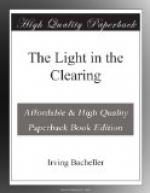The stranger lay still in the road. I lifted his head and dropped it quickly with a strange sickness. The feel of it and the way it fell back upon the ground when I let go scared me, for I knew that he was dead. The dust around him was wet. I ran down the hill a few steps and stopped and whistled to my filly. I could hear her answering whinny far down the dusty road and then her hoofs as she galloped toward me. She came within a few feet of me and stood snorting. I caught and mounted her and rode to the nearest house for help. On the way I saw why she had stopped. A number of horses were feeding on the roadside near the log house where Andrew Crampton lived. Andrew had just unloaded some hay and was backing out of his barn. I hitched my filly and jumped on the rack saying:
“Drive up the road as quick as you can. A man has been murdered.”
What a fearful word it was that I had spoken! What a panic it made in the little dooryard! The man gasped and jerked the reins and shouted to his horses and began swearing. The woman uttered a little scream and the children ran crying to her side. Now for the first time I felt the dread significance of word and deed. I had had no time to think of it before. I thought of the robber fleeing, terror-stricken, in the growing darkness.
The physical facts which are further related to this tragedy are of little moment to me now. The stranger was dead and we took his body to our home and my uncle set out for the constable. Over and over again that night I told the story of the shooting. We went to the scene of the tragedy with lanterns and fenced it off and put some men on guard there.
How the event itself and all that hurrying about in the dark had shocked and excited me! The whole theater of life had changed. Its audience had suddenly enlarged and was rushing over the stage and a kind of terror was in every face and voice. There was a red-handed villain behind the scenes, now, and how many others, I wondered. Men were no longer as they had been. Even the God to whom I prayed was different. As I write the sounds and shadows of that night are in my soul again. I see its gathering gloom. I hear its rifle shot which started all the galloping hoofs and swinging lanterns and flitting shadows and hysterical profanity. In the morning they found the robber’s footprints in the damp dirt of the road and measured them. The whole countryside was afire with excitement and searching the woods and fields for the highwayman.
“Mr. Purvis,” who had lost confidence suddenly in the whole world, had been found, soon after daylight next morning, under a haycock in the field of a farmer who was getting in his hay. Our hired man rose up and reported in fearful tones. A band of robbers—not one, or two, even, but a band of them—had chased him up the road and one of their bullets had torn the side of his trousers, in support of which assertion he showed the tear. With his able assistance we see at a glance both the quality and the state of mind prevailing among the humbler citizens of the countryside. They were, in a way, children whose cows had never recovered from the habit of jumping over the moon and who still worshiped at the secret shrine of Jack the Giant Killer.




